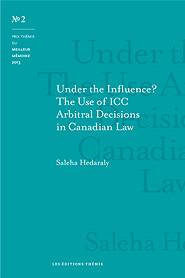Under the Influence? The Use of ICC Arbitral Decisions in Canadian Law
Saleha Hedaraly
Éditeur : THEMIS
ISBN papier: 9782894003534
Parution : 2015
Code produit : 1305348
Catégorisation :
Livres /
Droit et sciences juridiques /
Droit et sciences juridiques /
Droit des affaires
Formats disponibles
| Format | Qté. disp. | Prix* | Commander |
|---|---|---|---|
| Livre papier | En rupture de stock** |
Prix membre : 33,25 $ Prix non-membre : 35,00 $ |
*Les prix sont en dollars canadien. Taxes et frais de livraison en sus.
**Ce produits est en rupture de stock mais sera expédié dès qu'ils sera disponible.
Description
Can domestic judges rely on international arbitral awards to justify their decisions? How can these non-state norms influence statutory ones? Are they more permeable to common law or civil law? This book addresses these questions through a thorough methodological approach, comparing similar legal concepts across international legislation, international tribunal awards, and legislation and caselaw from both civil law and common law traditions.
More specifically, this comparative analysis will investigate the potential influence of arbitral decisions of the International Chamber of Commerce on Canadian substantive law and their relative importance in civil law and common law. In an era of increasing transnational transactions, this study of interlegality between international and domestic rules in commercial law demonstrates that despite slight conceptual differences, they generally reach the same results in practice.























